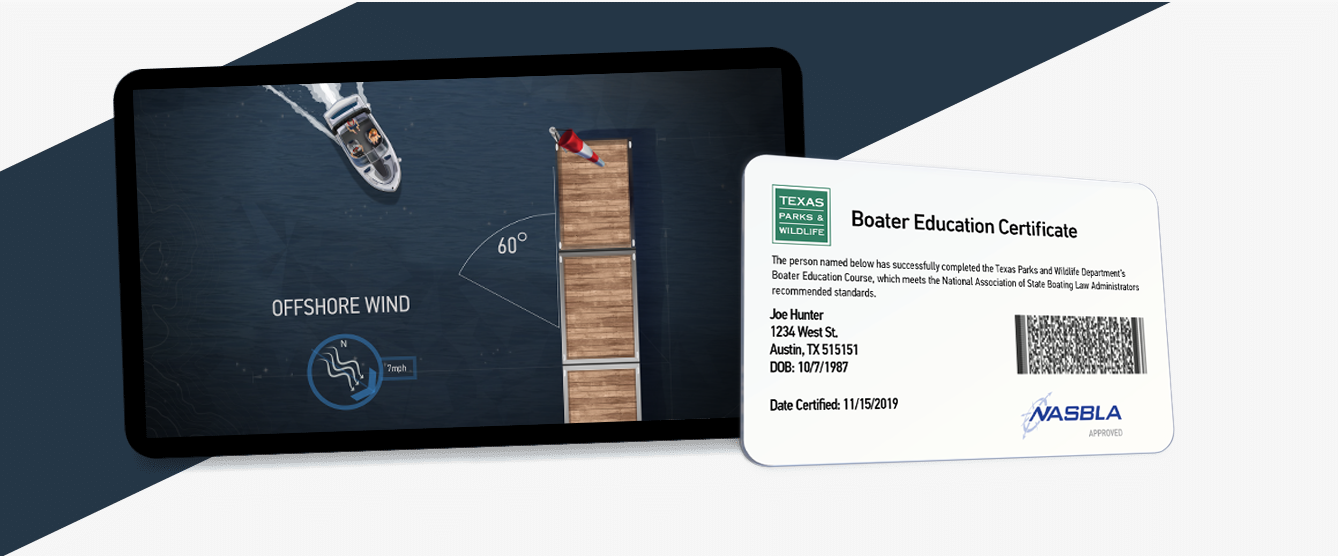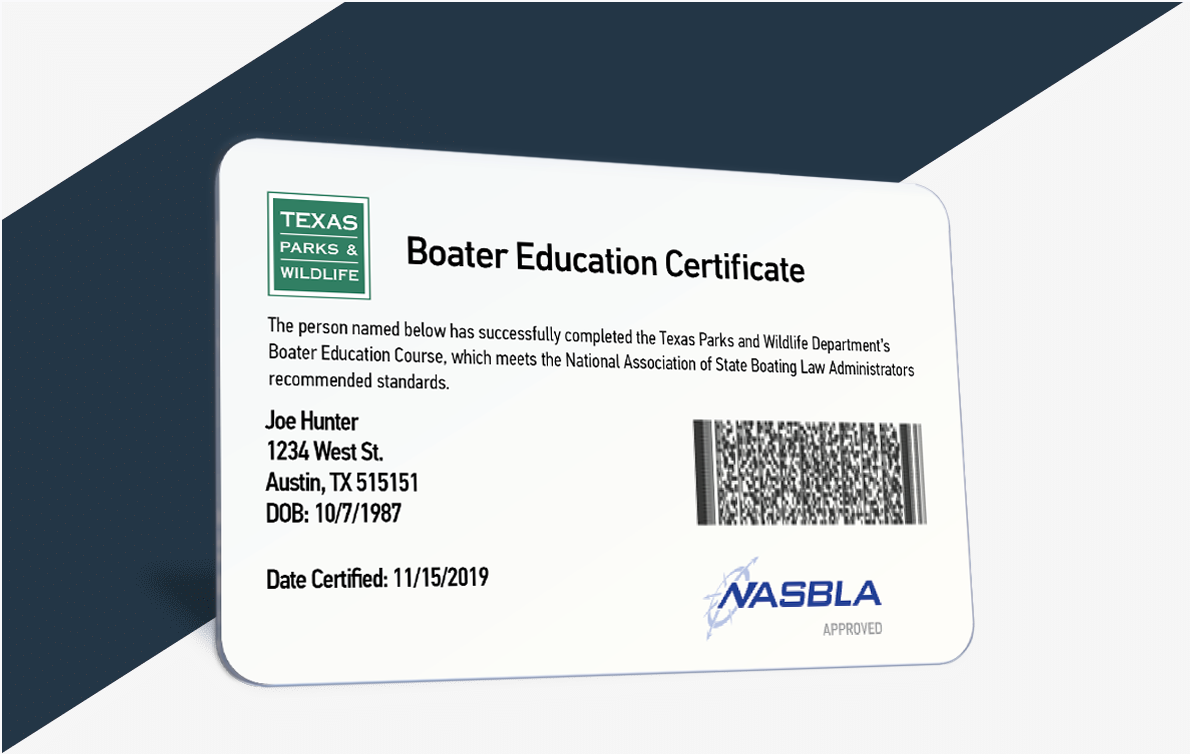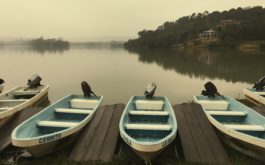Who needs a Texas Boater Education ID Card?
Boat operators who were born after September 1st, 1993, and who are at least 13 years of age are required to obtain a boater education card in order to legally operate:
- A boat with a motor of 15 hp or more
- A sail-powered boat over 14 ft. in length
- A Personal Watercraft (PWC) such as a jet-ski
In order to legally operate, operators are required to carry the following on board:
- Their photo ID (i.e. drivers license, or student ID card) and;
- Their Boater Education Certification card (boating license) issued by the Texas Parks and Wildlife Department, or;
- Proof of completion of an Operator’s License issued by the Coast Guard.
Non-residents are able to operate their boats within Texas so long as they have obtained and can supply proof of completing, a Boater Education Course from another state that is accepted by the Texas Parks and Wildlife Department and that has been NASBLA-approved.
TEXAS’ AGE AND HORSEPOWER RESTRICTIONS
Children under 13 years of age may operate a boat if they are supervised by a person who is:
- On board the boat while it is underway.
- Legally able to operate the boat, if required.
- 18 years of age or older.


Get your Official Texas
Boating License
The Official NASBLA and Texas State-Approved Boating Course, Test & License.
Get your Official Texas
Boating License
The Official NASBLA and Texas State-Approved Boating Course, Test & License.
Boat Registration Requirements in Texas
Boat registration requirements vary from state to state. To legally operate a boat in the state of Texas, you must obtain a Texas Certificate of Number and validation decals.
Exemptions:
- Human-powered craft such as canoes, kayaks, punts, rowboats, or rubber rafts (regardless of length).
- Wind-powered sailboats under 14 feet in length.
- Boats that have been registered in another state that are using Texas waterways for 90 consecutive days or less.
Once a boat has been registered, the owner will be provided with a Texas Certificate of Number and validation decals. The Certificate of Number must be carried on board the boat at all times during operation and must be available for inspection by law enforcement.
Prior to delivery of the decals, the owner may legally operate the vessel for a period not to exceed 45 days from the date stated on the receipt. The owner must print and carry the receipt on board the boat at all times during operation. The receipt must be available for inspection by law enforcement.
Certificates of Number are valid for 2 years. Boat owners will receive a renewal notice 3 months prior to the expiration of the certificate.
Registration Number and Decal Placement
- The numbers must be painted or permanently affixed to each side of the boat’s bow (boat owners are not permitted to display any other numbers in this area).
- The numbers must be read from left to right.
- The registration number must be in block letters that are at least 3 inches high, and in a color that contrasts with the color of the boat.
- The letters or numbers of the registration number must be separated from the letters by a hyphen or by an equivalent space.
- Validation decals must be affixed to each side of the boat, in line with the registration number and 3 inches toward the stern.
- The placement requirements also apply to personal watercraft (PWCs).
Other Registration Information
Texas Parks and Wildlife must be notified within 15 days if the owner of a registered boat updates or changes their address.
If a Certificate of Number is lost or damaged and must be replaced, the boat owner must fill out and submit a form, as well as pay a fee, in order to obtain a replacement.
If a boat is abandoned or destroyed, it must be reported to Texas Parks and Wildlife within 20 days. Boat owners must also surrender their current Certificate of Number and title.
You must obtain a title for all outboard motors, just as you would for a boat. Battery-operated trolling motors are an exception.
WHAT ARE Texas’ LIFE JACKET REQUIREMENTS?
All boats, including human-powered craft, must be equipped with one Type I, II, III or V wearable life jacket for each person on board. A Type V life jacket is only acceptable if it is used in accordance with the specific label instructions.
In Texas, passengers 13 years of age and under are required to wear a Coast Guard-approved, Type I, II, III or V life jacket while on board any boat that is under 26 feet in length while the boat is underway (unless the boat is moored, anchored or aground). This law also applies to human-powered craft.
Any person riding on or being towed by a PWC is required to wear a Coast Guard-approved Type I, II or III or V life jacket at all times.
Note: One Type V life jacket may be substituted for any other Type if it is approved by the Coast Guard for the activity it is being used for. Type V life jackets may not be substituted on children that weigh less than 90 lbs.
Texas’ Life Jacket Laws and Regulations
All boat being operated in Texas, including human-powered craft, must be equipped with one wearable (Type I, II, III or V) life jacket for each person on board. A Type V wearable life jacket is only acceptable if it is used in accordance with the specific label instructions.
Boats which are 16 feet in length or longer must, in additional, carry one Coast Guard-approved Type IV throwable device on board. This requirement does not apply to canoes or kayaks.
Texas’ Life Jacket Laws for Children
Children under 13 years of age in or on vessels under 26 feet must wear a U.S. Coast Guard approved wearable PFD while underway.
Texas BOATING LICENSE REQUIREMENTS FOR PERSONAL WATERCRAFTS (PWCS)
You need boater education if you were born on or after September. 1, 1993, and will be operating a boat over 15 horsepower, a personal watercraft (PWC), or a windblown vessel over 14 feet long in Texas.
Boating and Alcohol
Texas law prohibits anyone from boating while intoxicated (BWI). This includes the operation of any boat, sailboat, personal watercraft, water skis, sailboard, or similar device. Operators who have a blood alcohol concentration (BAC) of 0.08% or greater are considered intoxicated.
Alcohol and drugs cause impaired balance, blurred vision, poor coordination, impaired judgment, and slower reaction times. Alcohol is a major contributor to boating accidents and fatalities.
The following penalties will apply:
- First conviction carries a fine of up to $2,000 and/or jail time of up to 180 days.
- Second conviction carries a fine of up to $4,000 and/or jail time of up to one year.
- Third conviction carries a fine of up to $10,000 and/or jail time of 2-10 years.
By operating a vessel on Texas waters, you have consented to be tested for alcohol and/or drugs if arrested by a law enforcement official. Refusal to submit to testing may result in the suspension of your vehicle driver’s license for at least 180 days.
Texas’ Muffler and Noise Level Laws
Motorized boats in Texas are required to have a factory-type muffler or an exhaust water manifold installed on the engine.
Texas’ Waste Disposal Laws
In Texas, any boat with a permanently installed Marine Sanitation Device (MSD) is required to obtain a MSD certification and display a certification decal if the boat is operated on any waters in Texas, including coastal waters up to 3 nautical miles.
For certification and decal information contact: www.tceq.texas.gov or call (512) 239-0400.
Texas’ Laws for Careless, Reckless or Negligent Operation
It is illegal in the state of Texas to operate any boat, or to manipulate any waterskis, aquaplane, or similar device in a willfully or wantonly reckless or negligent manner that endangers the life, limb, or property of any person.
Examples of reckless or negligent operation include:
- Operating at a dangerous rate of speed.
- Boating in a restricted area.
- Creating a hazardous wake or wash.
- Encircling others engaged in water activities.
Texas’ Laws for Boat Speed Limits and Operation in Restricted Areas
In Texas, boaters must operate at a safe speed and obey any posted speed limits. Additionally, it is illegal to operate a boat in an area that has been clearly marked by buoys or any other distinguishing device, such as a bathing, fishing, swimming, or otherwise restricted area.
TExas’ BOAT ACCIDENT REPORTING REQUIREMENTS
An operator involved in a boating accident is required to:
- Stop their boat at the scene.
- Render assistance to any person who has been injured or who is in danger so long as they can do so without risking their safety or their passenger’s safety.
- Provide their name, address and boat information in writing to any person who was injured, and to the owner of any property that was damaged as a result of the accident.
The following types of accidents must be reported to the Texas Parks and Wildlife Division by the quickest means possible, if any of the following occur as a result of the accident:
- A person is killed or disappears from the boat.
- A person is injured and requires medical treatment beyond first aid.
- Damage to property as a result of the accident totals more than $2,000.
Note: Boating accident reports are confidential and are inadmissible in court as evidence.
Law Enforcement in Texas
- Texas Parks and Wildlife Law Enforcement Division.
- Game Wardens.
- Marine Safety Enforcement Officers.
- The Coast Guard (on federal waters).
Law enforcement in the state of Texas have the authority to stop and board any boat to ensure they are in compliance with state and federal laws.
A person convicted of failing to comply with law enforcement, or who violates laws within the Texas Water Safety Act will be guilty of a Texas Parks and Wildlife Code misdemeanor.
Those convicted of violations can be subject to a fine from $25-$500, and may also be required to complete an approved Boater Education Course.
Texas Parks and Wildlife Division CONTACT INFORMATION
For more information about safe boating in Texas, contact the Department at:
Texas Parks and Wildlife Division
4200 Smith School Road, Austin, TX 78744
(512) 389-4800 | (800) 792-1112









